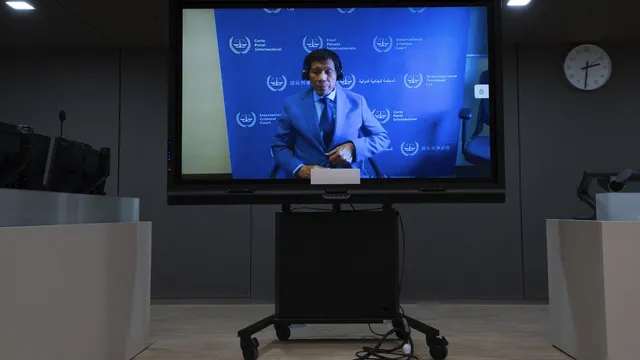
Rodrigo Duterte faces ICC trial for alleged crimes against humanity
2025-03-18 13:05- Rodrigo Duterte was arrested in Manila and transported to The Hague to face charges related to his anti-drug campaign.
- The ICC is addressing allegations of extrajudicial killings linked to Duterte's presidency, with varying estimates of the death toll.
- Duterte's supporters are contesting his arrest as politically motivated, while activists view it as a step towards justice.
Express your sentiment!
Insights
The former president of the Philippines, Rodrigo Duterte, was arrested in Manila last week and transported to The Hague, where he is facing charges linked to his controversial anti-drug policies. The International Criminal Court (ICC) is prosecuting allegations that Duterte orchestrated extrajudicial killings through death squads during his presidency, a period marked by significant violence and a high death toll. Many sources estimate that thousands have died due to these policies, with figures ranging from over 6,000 confirmed by police to allegations from human rights organizations of up to 30,000 deaths. The historical significance of this case lies in the international legal implications of prosecuting a former head of state for crimes against humanity. As he arrived at the ICC, Duterte connected with the judges via video link due to his frail health. During the hearing, he confirmed his identity and appeared responsive, although his supporters maintain that the arrest was politically motivated and unlawful. They argue that Duterte was denied due process, claiming that his extradition violates Philippine law as the country withdrew from the ICC in 2019 under his directive. This legal battle has incited protests from activists advocating justice for victims of the drug war, welcoming his arrest as a breakthrough against state impunity. At the same time, Duterte's family, particularly his son Sebastian Duterte, has expressed their determination to fight against what they deem an unjust legal proceeding, emphasizing political motives behind his arrest. The situation reflects ongoing tensions within Philippine politics as the current administration continues to grapple with the legacy of Duterte's presidency. Future hearings will determine whether there is sufficient evidence to proceed to a full trial, which could have extensive ramifications for the Philippines and its former leaders.
Contexts
The war on drugs initiated by President Rodrigo Duterte in the Philippines has been a controversial and transformative aspect of his administration since he assumed office in June 2016. Duterte's aggressive anti-drug campaign began on the premise of eradicating the drug trade and drug-related crimes across the country. His administration deployed police forces to conduct operations targeting drug users and dealers, often leading to extrajudicial killings and severe human rights violations. By the end of his term, reports indicated that thousands of alleged drug offenders had been killed, raising international outcry and calls for accountability. Despite the significant criticism, Duterte's policies received popular support domestically, with many citizens expressing relief about perceived increases in safety related to those involved in the drug trade. The Philippine government justified the war on drugs as necessary to combat the escalating drug problem that was perceived to be fostering crime and violence in society. These drug-related issues were often highlighted in Duterte's speeches, where he painted a dire picture of the country's youth being ensnared by drugs, which he described as a national crisis. As a consequence of his hardline stance, the administration saw a shift in public perception regarding drug use and criminal justice, with many people supporting a more militant approach to enforcement. However, the ensuing violence and allegations of abuse of power prompted a more complex discussion about the balance between public safety and human rights. Internationally, the war on drugs has faced heavy criticism from human rights groups, the United Nations, and various foreign governments. These entities have condemned the methods employed in the campaign, particularly the extrajudicial killings, which were seen as violations of international law and human rights treaties. Investigations into these allegations have been called for, yet the Duterte administration consistently denied such abuses occurred, labeling critics as enemies of the state. Furthermore, efforts were made to reposition the narrative from judicial accountability to a focus on drug enforcement, often portraying government actions as a necessary evil in the fight for a drug-free society. As Duterte’s presidency draws to a close, the legacy of the war on drugs remains contentious, dividing public opinions and sparking discussions about the future of drug policies in the Philippines. Duterte's approach has raised questions on how the incoming administration will handle drug-related issues and whether international pressures will lead to reforms in law enforcement practices. With the political landscape shifting, it may take time to assess the long-term impacts of Duterte’s methods, particularly in light of the deep societal divisions and the human costs associated with the war on drugs. The complexities of balancing societal safety, drug prevention, and human rights will likely remain salient issues for the future Filipino government.